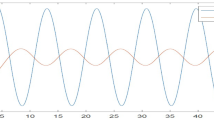Abstract
In this paper we prove convergence results for the series expansion of the solution to a linear functional differential equation. The results are consequences of an analysis of eigenfunction expansions for the generator of the solution map. This abstract approach unifies the treatment of retarded and neutral functional differential equations.
Similar content being viewed by others
References
H.T. Banks and A. Manitius, “Projection series for retarded functional differential equations with applications to optimal control problems”,J. Differential Eqns. 18, (1975), 296–332.
R. Bellman and K.L. Cooke,Differential-Difference Equations, Academic Press, New York, 1963.
R. Boas,Entire Functions, Academic Press, New York, 1954.
J.B. Conway,Functions of One Complex Variable (2nd ed.), Springer-Verlag, New York, 1978.
O. Diekmann, S.A. van Gils, S.M. Verduyn Lunel and H.O. Walther,Delay Equations: Functional-, Complex-, and Nonlinear Analysis, Applied Mathematical Sciences, Springer-Verlag, New York, to appear.
J.K. Hale and S.M. Verduyn Lunel,Introduction to Functional Differential Equations, Springer-Verlag, Berlin, 1993.
D. Henry, “Small solutions of linear autonomous functional differential equations”,J. Differential Eqns. 8, (1970), 494–501.
D. Henry, “Linear autonomous neutral functional differential equations”,J. Differential Eqns. 15, (1974), 106–128.
E. Hille and R. Phillips,Functional Analysis and Semigroups, Amer. Math. Soc., Providence, 1957.
M.A. Kaashoek and S.M. Verduyn Lunel “Characteristic matrices and spectral properties of evolutionary systems”,Trans. Amer. Math. Soc. 334, (1992), 479–517.
M.A. Kaashoek and S.M. Verduyn Lunel, “An integrability condition on the resolvent for hyperbolicity of the semigroup”,J. Differential Eqns. 112, (1994), 374–406.
B. Ja. Levin,Distribution of Zeros of Entire Functions (Revised Edition), Amer. Math. Soc., Providence, 1980.
N. Levinson and C. McCalla, “Completeness and independence of the exponential solutions of some functional differential equations”,Studies in Appl. Math. 53, (1974), 1–15.
A. Manitius, “Completeness and F-completeness of eigenfunctions associated with retarded functional differential equations”,J. Differential Eqns. 35, (1980), 1–29.
A. Pazy,Semigroups of Linear Operators and Applications to Partial Differential Equations, Springer, New York, 1983.
S.M. Verduyn Lunel,Exponential type calculus for linear delay equations, Centre for Mathematics and Computer Science, Tract No. 57 Amsterdam, 1989.
S.M. Verduyn Lunel, “Series expansions and small solutions for Volterra equations of convolution type”,J. Differential Eqns. 85, (1990), 17–53.
S.M. Verduyn Lunel, “About completeness for a class of unbounded operators”,J. Differential Eqns., (to appear).
D.V. Widder,The Laplace Transform, Princeton University Press, New Jersey, 1946.
Author information
Authors and Affiliations
Additional information
The research of S.M. Verduyn Lunel has been made possible by a fellowship of the Royal Netherlands Academy of Arts and Sciences
Rights and permissions
About this article
Cite this article
Verduyn Lunel, S.M. Series expansions for functional differential equations. Integr equ oper theory 22, 93–122 (1995). https://doi.org/10.1007/BF01195491
Received:
Issue Date:
DOI: https://doi.org/10.1007/BF01195491



